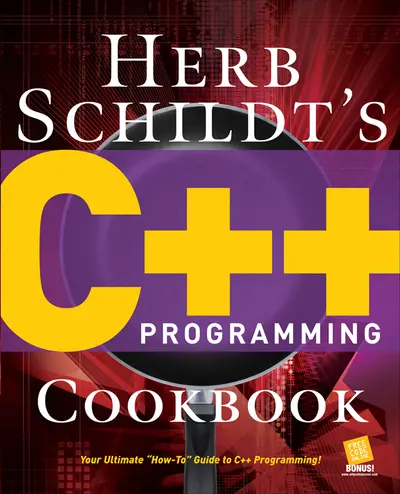My Account Details

ISBN10: 007148860X | ISBN13: 9780071488600

Step 1 . Download Adobe Digital Editions to your PC or Mac desktop/laptop.
Step 2. Register and authorize your Adobe ID (optional). To access your eBook on multiple devices, first create an Adobe ID at account.adobe.com. Then, open Adobe Digital Editions, go to the Help menu, and select "Authorize Computer" to link your Adobe ID.
Step 3. Open Your eBook. Use Adobe Digital Editions to open the file. If the eBook doesn’t open, contact customer service for assistance.
Publisher's Note: Products purchased from Third Party sellers are not guaranteed by the publisher for quality, authenticity, or access to any online entitlements included with the product.
Your Ultimate "How-To" Guide to C++ Programming!
Legendary programming author Herb Schildt shares some of his favorite programming techniques in this high-powered C++ "cookbook." Organized for quick reference, each "recipe" shows how to accomplish a practical programming task. A recipe begins with a list of key ingredients (classes, functions, and headers) followed by step-by-step instructions that show how to assemble them into a complete solution. Detailed discussions explain the how and why behind each step, and a full code example puts the recipe into action. Each recipe ends with a list of options and alternatives that suggest ways to adapt the technique to fit a variety of situations. Whether you're a beginner or an experienced pro, you'll find recipes that are sure to satisfy your C++ programming appetite!
Topics include:
String Handling • Standard Template Library (STL) Containers • Algorithms • Function Objects • Binders • Negators • Adaptors • Iterators • I/O • Formatting Data
Learn how to:
- Tokenize a null-terminated string
- Create a search and replace function for strings
- Implement subtraction for string objects
- Use the vector, deque, and list sequence containers
- Use the container adaptors stack, queue, and priority_queue
- Use the map, multimap, set, and multiset associative containers
- Reverse, rotate, and shuffle a sequence
- Create a function object
- Use binders, negators, and iterator adapters
- Read and write files
- Use stream iterators to handle file I/O
- Use exceptions to handle I/O errors
- Create custom inserters and extractors
- Format date, time, and numeric data
- Use facets and the localization library
- Overload the [ ], ( ), and -> operators
- Create an explicit constructor
- And much, much more
Chapter 2. String Handling
Chapter 3. Working with STL Containers
Chapter 4. Algorithms, Function Objects, and Other STL Components
Chapter 5. Working with I/O
Chapter 6. Formatting Data
Chapter 7. Potpourri
Index
Need support? We're here to help - Get real-world support and resources every step of the way.